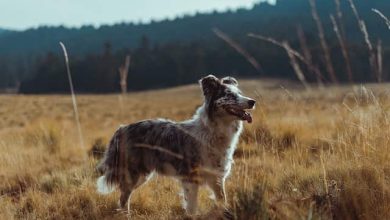When Are Border Collies Fully Grown


Border Collies are popular and intelligent dog breeds known for their herding abilities and energetic nature. If you’re considering bringing a Border Collie into your family, it’s essential to understand their growth and development. In this article, we will explore when Border Collies reach their full growth, both physically and mentally. We’ll also discuss the factors that influence their growth rate and provide tips on how to care for a growing Border Collie.
Introduction
Border Collies are medium-sized dogs that originate from the border regions between England and Scotland. They are highly regarded for their intelligence, agility, and exceptional herding skills. As responsible pet owners, it’s important to have a comprehensive understanding of a Border Collie’s growth process to ensure their well-being and development.
Understanding Border Collies
Before delving into the growth stages of Border Collies, it’s crucial to grasp their unique characteristics. Border Collies have a distinct appearance with a well-proportioned body, athletic build, and a double coat that provides protection in various weather conditions. Their intelligence, coupled with an energetic and driven personality, makes them excellent working dogs.
Physical Development of Border Collies
Growth Stages in Border collies
Like most dog breeds, Border Collies undergo several growth stages throughout their lives. It’s important to note that the rate of growth can vary between individuals, influenced by factors such as genetics, nutrition, and exercise. Generally, Border Collies go through the following growth stages:
- Puppy Stage: From birth to around 6 months, Border Collie puppies experience rapid growth. They gain weight, increase in size, and develop their basic physical features.
- Adolescent Stage: Between 6 months and 1 year, Border Collies continue to grow but at a slower pace. This stage is crucial for their bone and muscle development.
- Young Adult Stage: From 1 to 2 years, Border Collies reach their full height, and their bodies become more proportionate. However, they may continue to gain muscle mass and refine their overall physique.
Border collies Height and Weight
The average height of an adult Border Collie ranges from 18 to 22 inches (46 to 56 cm) at the shoulder. When fully grown, they typically weigh between 30 to 55 pounds (14 to 25 kg), with males often being slightly larger than females. However, it’s important to remember that individual variations can occur within these ranges.
Mental Development of Border Collies
Cognitive Abilities
Border Collies are renowned for their exceptional intelligence. Their cognitive development progresses throughout their growth stages, with the capacity to learn and understand various commands and tasks. Early socialization and consistent training are crucial for their mental development. Border Collies thrive when provided with mental stimulation and engaging activities that challenge their intellect. Training sessions, interactive toys, and puzzle games can help enhance their problem-solving skills and keep their minds sharp.
Training and Socialization
Proper training and socialization play a significant role in shaping the mental development of Border Collies. Starting from an early age, it’s important to expose them to various environments, people, and other animals. This exposure helps them develop confidence, adaptability, and good social skills. Positive reinforcement-based training methods work best with Border Collies, as they respond well to rewards and praise.
Factors Affecting Growth Rate of Border collies
Collies Genetics
Genetics play a fundamental role in determining the growth rate and size of Border Collies. The traits passed down from their parents and ancestors influence their physical and mental development. Breeders who focus on maintaining the breed standards and prioritize the health and well-being of their dogs contribute to producing Border Collies with optimal growth potential.
Border collies Nutrition and Exercise
Proper nutrition and regular exercise are crucial for the healthy growth of Border Collies. Providing a balanced diet that meets their nutritional needs, including high-quality protein, essential vitamins, and minerals, promotes strong bones, muscles, and overall development. Consultation with a veterinarian can help determine the appropriate diet for a growing Border Collie.
See also: Should You Trim the Hair Around Your Dog’s Eyes?
Regular exercise is vital for their physical and mental well-being. Border Collies are active dogs that require ample opportunities for physical activity, such as daily walks, playtime, and mental stimulation exercises. Engaging in activities that align with their herding instincts, such as agility training or participating in dog sports, can be particularly beneficial.
Signs of Full Growth in Border Collies
Physical Appearance of Border collies
Border Collies generally reach their full physical maturity by the age of 1 to 2 years. At this stage, their bodies have developed the characteristic features of the breed. Their height, weight, and body proportions stabilize, and their coat fully develops. However, it’s important to note that individual dogs may have slight variations in their growth patterns.
Behavior and Energy Levels of Border collies
As Border Collies reach their full growth, their energy levels and behavior also start to stabilize. They may exhibit a calmer demeanor compared to their puppy and adolescent stages. However, it’s important to remember that Border Collies are naturally energetic dogs, and they will still require regular exercise and mental stimulation to keep them happy and balanced.
Caring for a Growing Border Collie
Proper Nutrition for a border collie
During the growth stages, it’s crucial to provide a balanced diet that meets the nutritional needs of a growing Border Collie. High-quality dog food that contains appropriate levels of protein, healthy fats, vitamins, and minerals is essential. Consultation with a veterinarian can help determine the specific dietary requirements based on the individual dog’s age, size, and activity level.
Regular Exercise to your collie dog
Border Collies are highly energetic and require regular exercise to maintain their physical and mental well-being. Engaging in activities such as daily walks, interactive play sessions, and challenging training exercises is essential. Providing them with outlets for their natural herding instincts, such as fetch or agility training, can be particularly enjoyable for them.
Conclusion
Border Collies reach their full growth, both physically and mentally, by the age of 1 to 2 years. The growth stages they go through contribute to their overall development and characteristics as a breed. Understanding the factors that influence their growth rate and providing them with appropriate care, nutrition, and exercise are crucial for their well-being. As responsible owners, ensuring a nurturing environment for their growth will allow Border Collies to thrive and lead healthy, fulfilling lives.
See also: When Do Australian Cattle Dogs’ Ears Stand Up?
FAQs about Border collies growth
How long does it take for a Border Collie to reach full size?
The time it takes for a Border Collie to reach full size can vary from dog to dog. On average, Border Collies reach their full height and weight between the ages of 1 to 2 years. However, it’s important to note that individual dogs may have different growth rates. Factors such as genetics, nutrition, and overall health can influence the pace at which a Border Collie reaches its full size. Monitoring their growth and consulting with a veterinarian can provide a better understanding of their specific development.
Are female Border Collies smaller than males?
In general, female Border Collies tend to be slightly smaller than their male counterparts. However, it’s important to remember that there can be variations within the breed. The size difference between male and female Border Collies is usually minimal, and it primarily depends on the individual dog’s genetics and overall growth patterns.
Can I speed up the growth of my Border Collie?
It’s essential to allow a Border Collie to grow and develop at a natural pace. Attempting to speed up their growth can have detrimental effects on their health and well-being. Providing a balanced diet, regular exercise, and appropriate veterinary care will support their growth and ensure they reach their full potential.
What should I feed my Border Collie to support their growth?
To support the healthy growth of a Border Collie, it’s important to feed them a well-balanced diet that meets their nutritional needs. High-quality dog food that contains a suitable balance of protein, carbohydrates, healthy fats, vitamins, and minerals is recommended. Consulting with a veterinarian can help determine the specific dietary requirements based on the dog’s age, size, and overall health.
Is it normal for a Border Collie to be smaller than average?
While Border Collies generally fall within a certain height and weight range, it’s important to remember that there can be variations within the breed. Some Border Collies may naturally be smaller or larger than the average size. As long as the dog is healthy, active, and exhibits no signs of underlying health issues, there is usually no cause for concern.
In conclusion, understanding the growth process of Border Collies is crucial for their overall well-being. They reach their full growth, both physically and mentally, by the age of 1 to 2 years. Providing them with proper nutrition, regular exercise, and a nurturing environment sets the stage for their healthy development. By being attentive to their individual needs and consulting with professionals, you can ensure that your Border Collie thrives and becomes a cherished member of your family.


